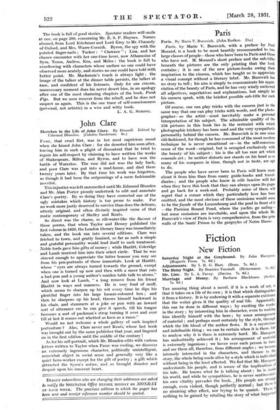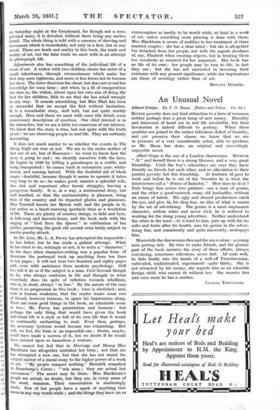Fiction
New Fiction
Adjustments. By I. R. G. Hart. (Benn. 78. 6d.)
Marriage and Money. By Barbara Blackburn. (Seeker. 7s. 6d.) THE amazing thing about a novel, if it is a work of art, is that it takes on a life of its own ; it is that which distinguishes it from a history. It is by endowing it with a separate existence that the writer gives it the quality of real life. Apparently, this can be done in different ways ; by exciting the reader in the story ; by interesting him in character, even to making him identify himself with the hero ; by some arrangement of material ; and perhaps most certainly by the style, through which the life blood of the author flows. It is a mysterious and indefinable thing ; we can be certain when it is there, but to analyse why it is there is extremely hard. Mr. Hampsaa has undoubtedly achieved it ; his arrangement of material is extremely ingenious ; we hover over each person in turn, and see them all, therefore, from different angles ; we become intensely interested in the characters, and thence in the story, the whole being made alive by a style which is individual without being in the least affected. We feel that Mr. Hampsall understands his people, and is aware of the implications of his tale. He knows what he is talking about ; he is inside his world, and while he sympathises, he is never sentimental his own vitality pervades the book._ His people are strange enough, even violent, though perfectly normal ; but there ic no straining after effect, nor trying to be quaint. There i" nothing to be gained by retailing the story of what happened
on Saturday night at the_ Greyhound, for though not a com- plicated story, it is detailed, without there being any useless detail. The whole thing is told with a sureness of drawing and movement which is remarkable, not only in a first, but in any novel. There are truth and reality in this book, the truth and reality of art, not the false truth we meet with in an attempt to photograph life.
Adjustments also has something of the individual life of a work of art. A widow with two children cheats her sister of a small inheritance, through circumstances which make her first step seem righteous, and more or less forces her to become her slave. The sister discovers the cheat, but does not reveal her knowledge for some time ; and when, in a fit of exasperation she does so, the widow, intent upon her own aim of doing the hest for her children, fails to see that she has acted wrongly in any way. It sounds astonishing, but Miss Hart has been so successful that we accept the fact without hesitation. It is a remarkable story, well told, but not quite starkly enough. Here and there we meet with some idle detail, some unnecessary description of emotion. Our chief interest is in the characters, but we are a little too conscious of our interest. We know that the story is true, but not quite with the truth of art : we are observing people in real life. They are certainly fascinating.
It does not much matter to us whether the events in The Shiny Night are true or not. We are in the realm neither of fact nor of art, but of Romance : we want to know how the story is going to end ; we identify ourselves with the hero. He begins in 1830 by killing a gamekeeper in a scuffle, and being transported : he comes back in coronation year, white- haired, and nursing hatred. With the doubtful aid of black magic—doubtful, because though it seems to operate it takes very long to do so—he makes good, marries a splendid wife, dies rich and repentant after heroic struggles, leaving a prosperous family. It is, in a way, a sentimental story, but well handled, so that the sentimentality is pleasant, being that of the country and its departed glories and glaznours. Miss Tuns-tall knows her Mercia well, and the people in it, but rather as a heart-warming spectacle than as a revelation of life. There are plenty of country doings, in field and byre, in folk-song and harvest-home, and the book ends with the singing of "God Save the Queen" in celebration of her jubilee, preserving the good old second verse lately subject to namby-pamby attack.
In Mr. Line, Mr. L. A. Pavey has attempted the impossible : he has failed, but he has made a gallant attempt. What he has tried to do, wittingly or not, is to write a "character." In the days when character-writing was a popular form of literature the portrayal took up anything from ten lines to ten pages ; it will not bear two hundred and eighty pages odd, even with assistance from modem psychology. Still less will it do so if the subject is a man, Civil Servant though he be, who always conforms in life and thought to what everybody does (in spite of velleities towards rebellion), who is, in short, always "in line." By the nature of the case there is no progression in this book ; time is abolished : and, such is human weakness, that the reader wants some sort of thread, however tenuous, to space his impressions along. There are some good things in the book, an admirable scene or two ; Mr. Pavey has penetration and humour : but perhaps the only thing that would have given the book individual life is a style so full of its own life that it would be continually enchanting to read: Even then, perhaps, the necessary lyricism would become too exhausting. But still, we feel, the form is an impossible one; Sterne, maybe, could have made a success of it, but we doubt if he would have entered upon so hazardous a venture.
We cannot but feel that in Marriage and Money Miss Blackburn has altogether mistaken her form ; not that she has attempted a new one, but that she has not raised the subject matter of a moral essay to the higher power of a work of art. "My people conquer nothing," Meredith remarked in Beauchamp's Career ; "win none ; they are actual but uncommon." The secret may lie there. Miss Blackburn's people are actual, no doubt, but they are, in every sense of the word, common. Their conversation is shatteringly crude. Few of her people have a spark of anything that seems many way worth while ; and the things they have are so
commonplace as hardly to be worth while, at least in a work of art, unless something more piercing is done with them. Miss Blackburn is aware of realities in her treatment of three married couples ; she has a clear mind : but she is altogether too detached from her people, not with the superb aloofness of, say, Flaubert when creating objects, but in treating them too cavalierly as counters for her argument. Her book has no life of its own : her people may be true to life, in fact they are ; but she has not succeeded in investing their existence With any general significance, while her implications are those of sociology rather than of art.
hONAMY DOBIOtE.















































 Previous page
Previous page